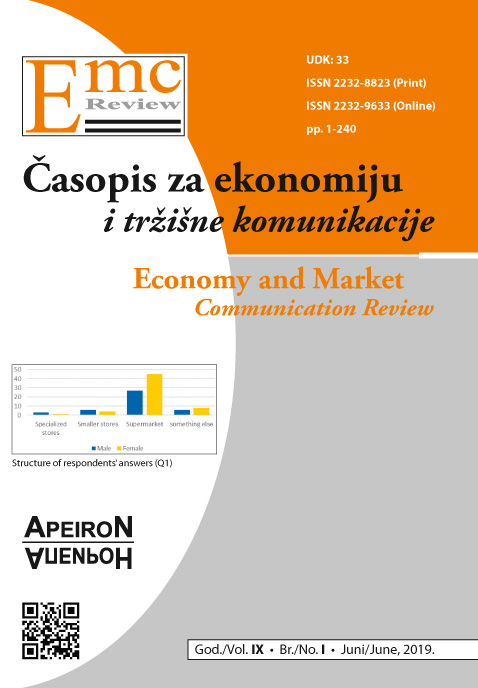IMPACT OF HOUSEHOLD INCOME ON FOOD AND NON-ALCOHOLIC BEVERAGES CONSUMPTION IN BOSNIA AND HERZEGOVINA – A MICROECONOMIC APPROACH
DOI:
https://doi.org/10.7251/EMC1901104DAbstract
The aim of this paper is to quantify the patterns of consumption of food and non-alcoholic beverages of households in Bosnia and Herzegovina in relation to household income - with a focus on the validity of the first Engel’s Law. The problem of household consumption in the last three decades has not been the subject of an analysis of any comprehensive study, both in Bosnia and Herzegovina and ex-Yugoslavia, which points to the relevance of this issue in Bosnia and Herzegovina. Empirical research is based on the econometric modeling of Engel curves using single equation modeling.. Household Budget Surveys in Bosnia and Herzegovina, available for four years (2004, 2007, 2011, 2015), are a key source of data, which are methodologically harmonized with the methodology of the Agency for Statistics of the EU. An analysis of the impact of income on household consumption has been made on the basis of data on income and food expenditure that are given on a monthly basis. Taking into account 6 functional forms and three territorial coverage (FBiH, RS and BiH) for each year of the survey there were 18 regressions estimated. The OLS-Ordinary Least Squares method was used to estimate the parameters of the regression equations based on the sample. Of all the functional forms of the Engel curves, which are estimated in the paper, the double logarithmic form best fits to food and non-alcoholic beverages consumption and it is distinguished as representative. The results of the econometric modelling of Engel’s curves were expected to confirm the significance of income as a key determinant of consumption, but also provided a deeper insight into the explanatory power that income has in explaining the variation in household expenditure on food and non-alcoholic beverages. The information on the intensity of the impact of income on changes in consumption (expenditure) provides income demand elasticities, which are a key parameter in the empirical check of the validity of Engel’s laws. The estimated value of the income elasticity is smaller than the unit and in accordance with the first Engel law. Comparison of the estimated parameters of model for different years gives an insight into the time stability of consumer preferences of households. Estimated income elasticities of food and non-alcoholic drinks show volatility in the observed period, which implies a change in consumer preferences. The results of this paper can serve as a basis for future extensive econometric research of personal consumption of the population of Bosnia and Herzegovina.Downloads
Published
2019-06-06
Issue
Section
Чланци
